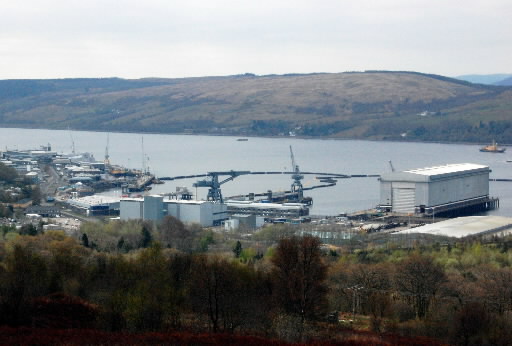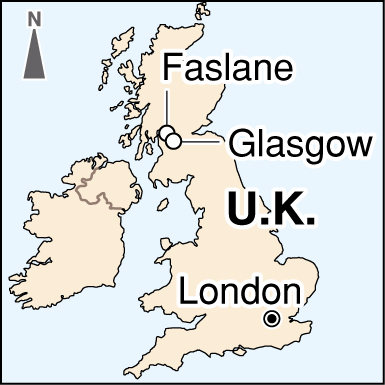Nuclear weapons can be eliminated: Chapter 5, Part 1
Jul. 19, 2009
Chapter 5: Unseen targets in the U.K. and France
Part 1: Self-contradiction
by Yumi Kanazaki, Staff Writer
Abolition proposed
The United Kingdom and France are believed to possess an estimated 160 and 300 nuclear weapons, respectively. Both have cited nuclear deterrence as the reason for their continued possession of arsenals sufficient to threaten the existence of humankind. But with enemies no longer in sight, does that theory still hold water or are there holes in it? The Chugoku Shimbun visited both countries and looked at the conditions under which cuts or the total elimination of nuclear weapons could be made.
Her Majesty’s Naval Base Clyde in Faslane in southwest Scotland is the home port of four nuclear powered submarines that carry ballistic nuclear missiles with a range of 7,400 kilometers. From the crest of a nearby hill, the Firth of Clyde and part of the base were visible.
But there were no nuclear submarines to be seen. A member of a local watchdog group, who accompanied me, was puzzled. “Ordinarily, one of the subs is anchored at the base,” she said. She suspected the absence of the submarines may have been related to a collision with a French nuclear submarine that took place in the Atlantic in February of this year.
The U.K.’s nuclear capability is referred to as “Trident” from the name of the missiles carried by the nuclear submarines. Twenty-four hours a day, seven days a week, four nuclear submarines take turns on patrol so one of them is always at sea and armed with nuclear weapons. This has been an ongoing mission since the days of the Cold War. The collision occurred during one of those patrols.
At a forum held by a local anti-nuclear group in Glasgow, Scotland’s largest city, 40 kilometers from Faslane, Tim Hare, former director of Nuclear Policy in the British Defense Ministry, stressed the reliability of the subs. “Damage was minimal, which demonstrates how well the nuclear submarines hold up in a collision,” he said.
Mary Millington, 61, objected saying, “They were just lucky. What if a nuclear weapon or reactor had been damaged? As long as the base is there, we have to live with danger.” The fact that the Defense Ministry said nothing about the accident until the appearance of a newspaper report exacerbated distrust.
The British government is proceeding with a plan to replace the aging submarines. If the plan is implemented, the U.K. will be able to maintain its current nuclear capability until at least the 2050s.
Meanwhile, in February, the government issued a report titled “Lifting the Nuclear Shadow: Creating the Conditions for Abolishing Nuclear Weapons.”
In the London offices of the Campaign for Nuclear Disarmament, Britain’s largest anti-nuclear organization, Bruce Kent, 79, the vice president, said emphatically, “I don’t want to hear the same old proposals for nuclear disarmament. I want to know what sort of decision will be made about Britain’s nuclear capability.” He pointed out the contradiction in the government’s stated desire to maintain nuclear deterrence and its expressed intention to abolish its nuclear weapons.
The U.K. has relatively few nuclear weapons, and of the five nuclear powers, conditions for abolition are believed to be best there. People in the U.K and abroad await the government’s impending decision on whether or not the U.K. will build new nuclear submarines and continue to rely on nuclear deterrence for another 40 years or more.
(Originally published June 21, 2009)
To comment on this article, please click the link below. Comments will be moderated and posted in a timely fashion. Comments may also appear in the Chugoku Shimbun newspaper.









